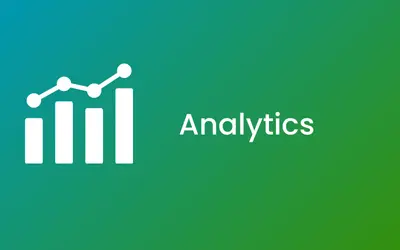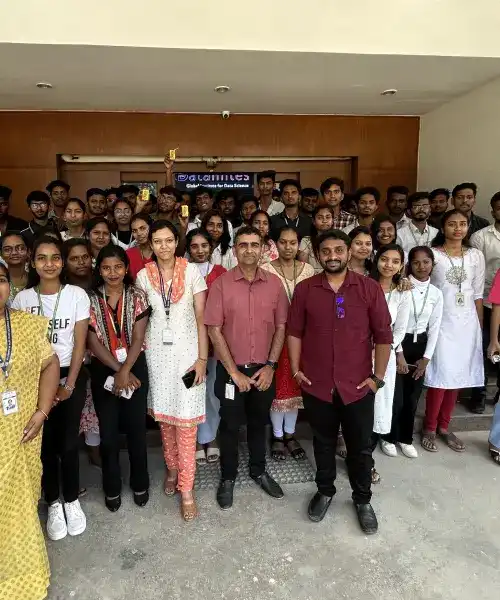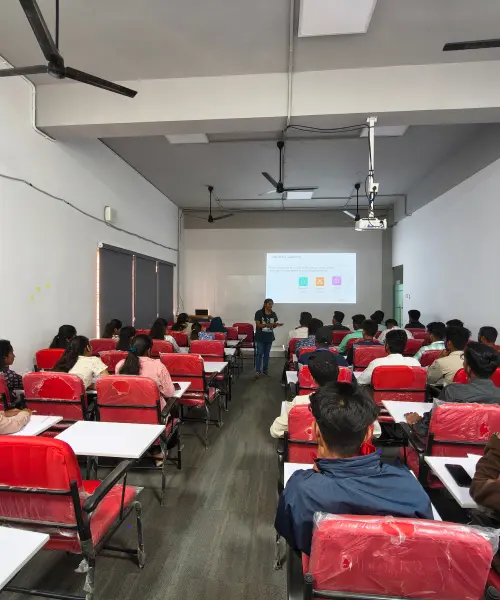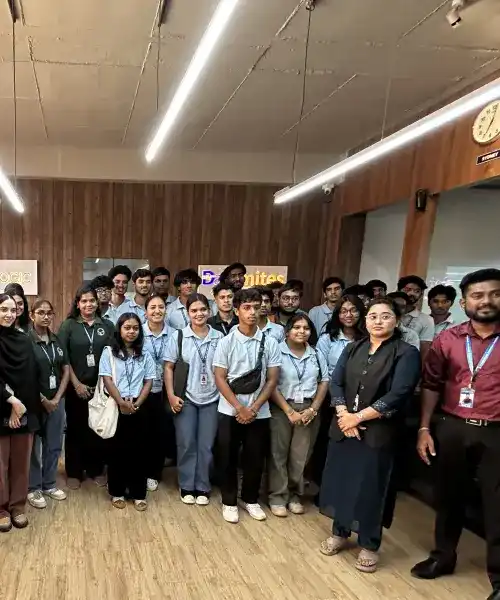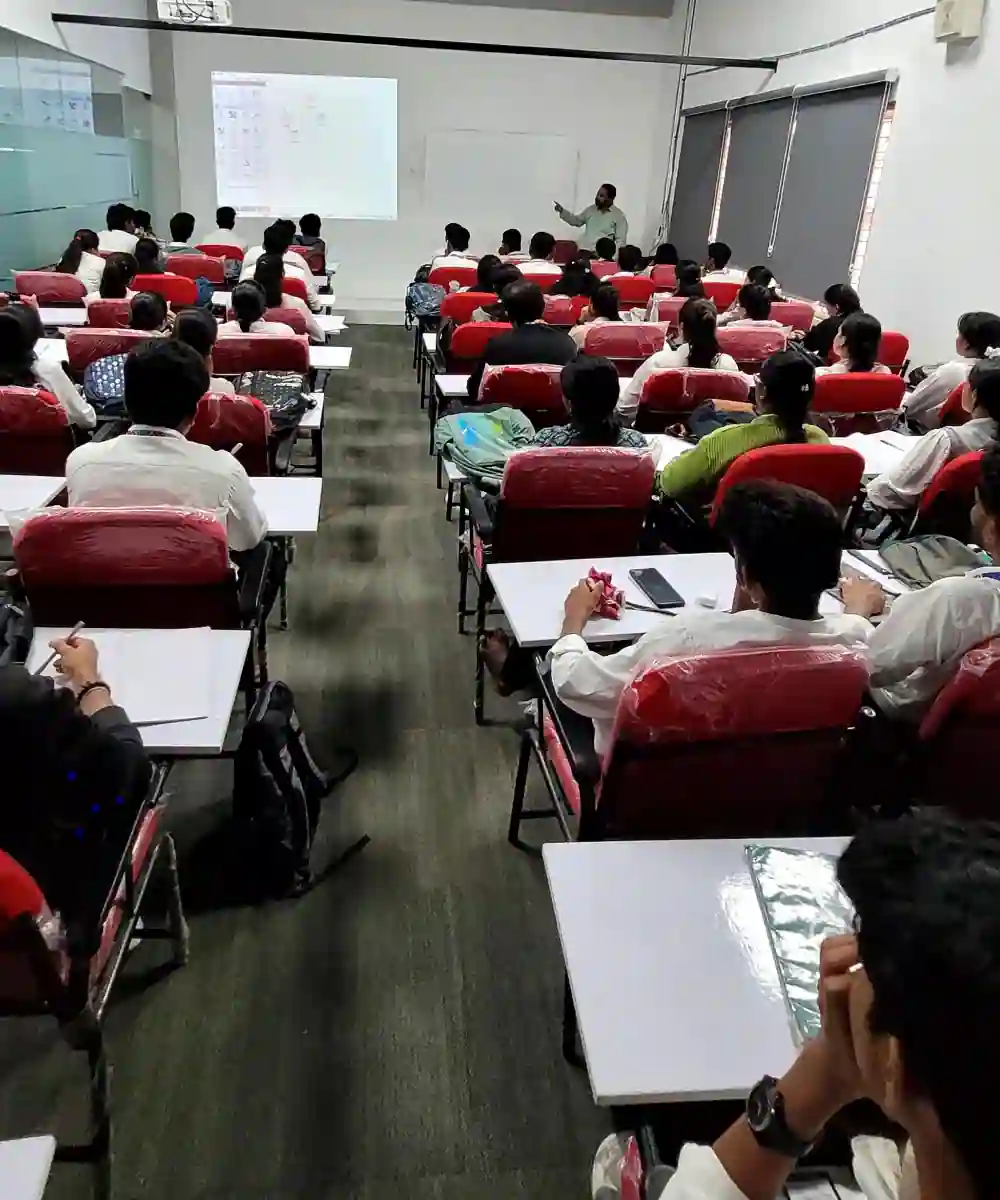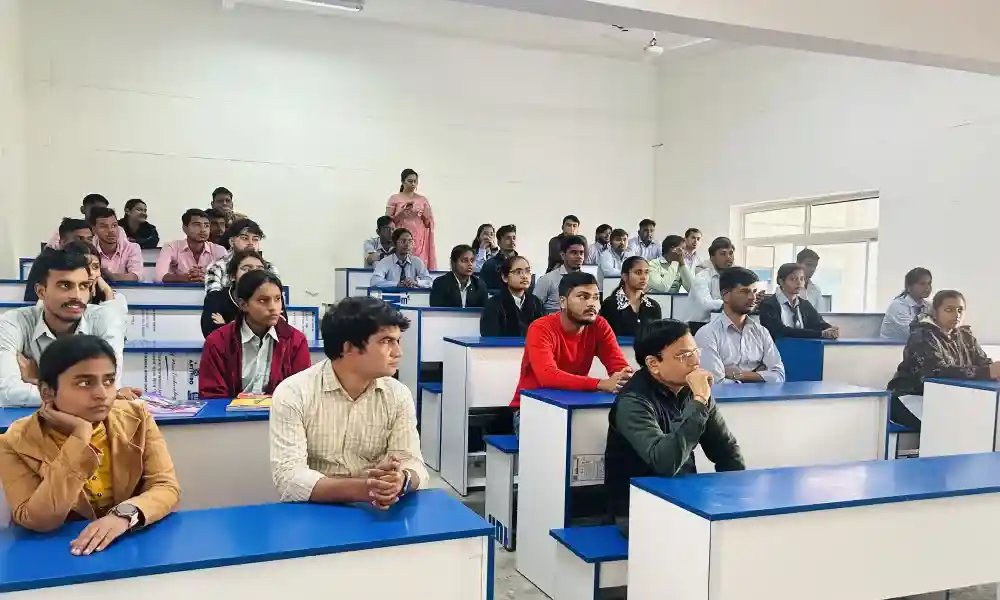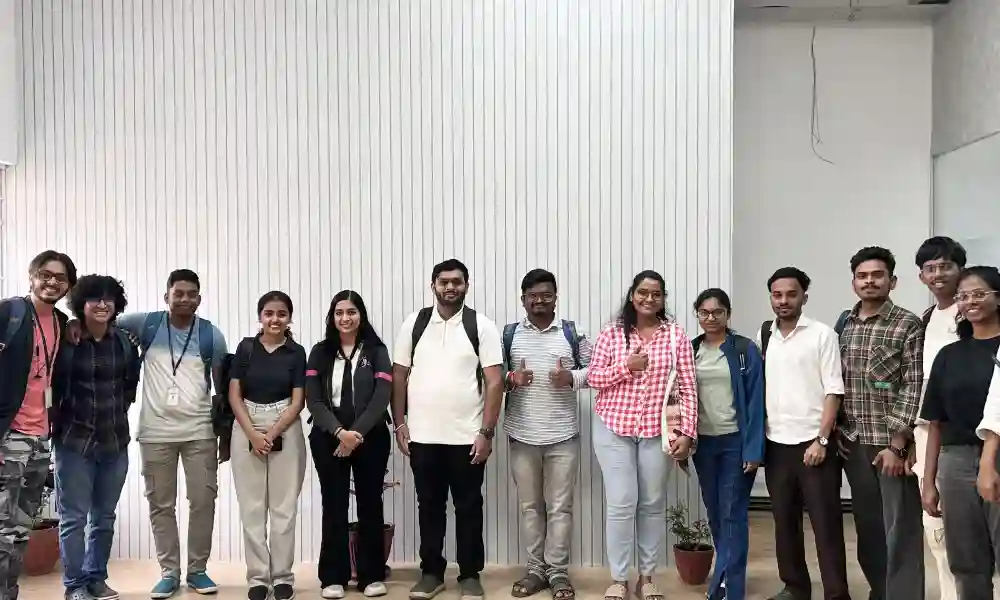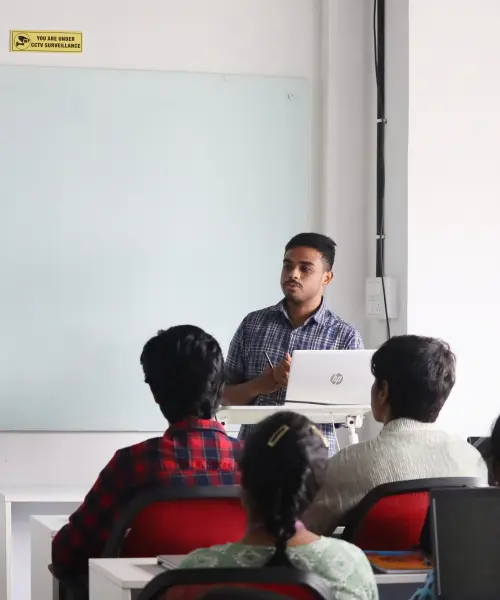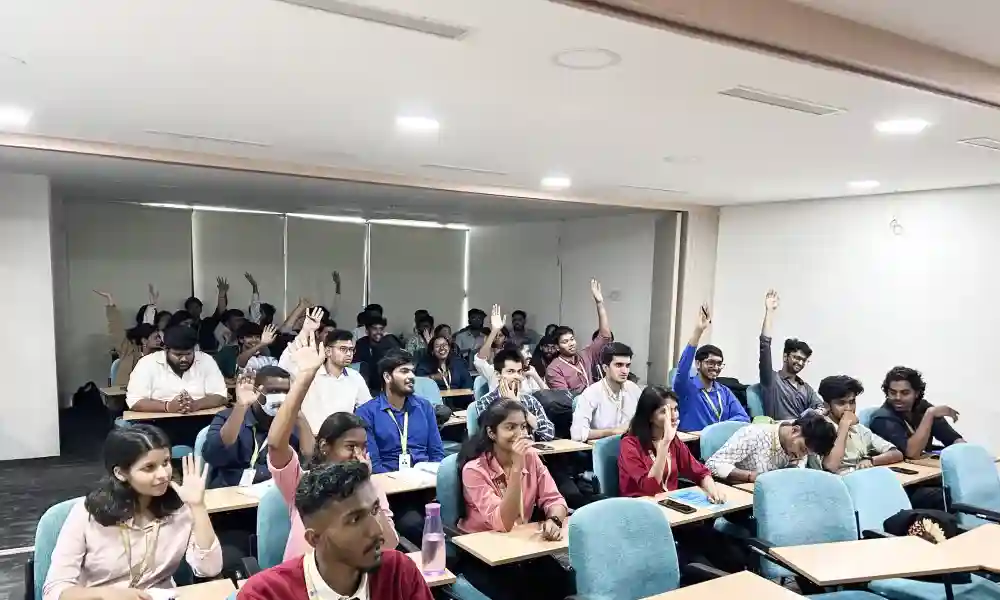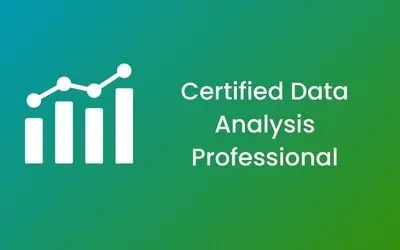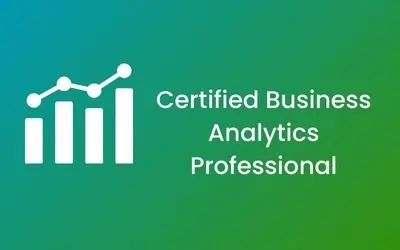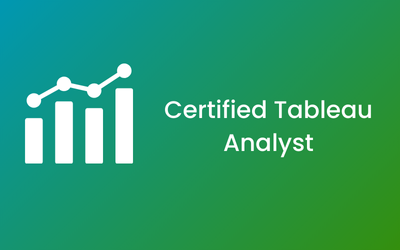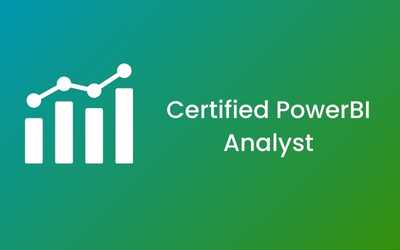-
High Job Demand: Kolkata is emerging as a major analytics hub, with companies in IT, BFSI, retail, healthcare, and startups actively hiring skilled data and business analysts to support data-driven decision-making.
-
Future-Proof Career Opportunities: Build a future-proof career with excellent compensation, recognition, and long-term stability in analytics roles.
-
Industry-Aligned Curriculum: The course is designed with expert guidance to match the requirements of Kolkata’s analytics job market, covering the latest tools, business applications, and real-world analytics workflows.
-
Expert-Led Sessions: Learn from experienced industry professionals who share practical insights, simplify concepts, and guide you through real business problem-solving.
-
Hands-On Learning: Gain practical exposure through case studies, live datasets, dashboards, and end-to-end analytics projects that help you develop solid job-ready skills.
-
Master Essential Tools: Become proficient in must-have tools like Excel, SQL, Python, Power BI, and Tableau, which are widely used across Kolkata’s analytics and IT companies.
-
Dedicated Career Support: Skillfloor offers complete placement assistance, resume building, mock interviews, personalised interview preparation, and job referrals across Kolkata and West Bengal.
-
Recognised Certification: Earn an industry-recognised Skillfloor certification that adds credibility to your profile and improves your chances of securing top analytics roles.
-
Strong Alumni Community: Join a growing network of Skillfloor learners and professionals in Kolkata who support peer learning, mentoring, and career growth.
-
Affordable & High-Value Training: Skillfloor offers a practical, industry-oriented Data Analytics course at an affordable fee of just ₹14,900. This cost-effective program provides hands-on training, real-world projects, and expert guidance to ensure strong career returns on your investment.
Why Business Analytics Is Important in Today’s Data-Driven World
In today’s digital economy, Business Analytics has become the backbone of smart decision-making, helping companies convert raw data into meaningful insights. Alongside analytics, AI learning is transforming how businesses interpret data, automate processes, and make predictive decisions. With nearly 97% of organisations globally investing in data initiatives, the demand for skilled analytics professionals is growing faster than ever. As per industry reports, the Indian analytics market is expanding at a CAGR of 25%, expected to cross USD 118 billion by 2026—making analytics one of the most future-proof career choices.
In Kolkata, the adoption of analytics is rising rapidly across key sectors such as IT services, BFSI, healthcare, logistics, manufacturing, and retail. Major companies in the region are now using data-driven strategies to improve customer experience, optimise operations, reduce risk, and accelerate business growth. According to regional employment insights, the demand for Business Analysts and Data Analysts in Kolkata has increased by nearly 30% over the past two years, especially as businesses shift toward automation, digital transformation, and predictive decision-making. Business Analytics empowers organisations with real-time data visibility, helping them identify trends, forecast business outcomes, and make decisions backed by evidence, not guesswork. From creating interactive dashboards in Power BI to analysing customer behaviour using SQL and Python, analytics professionals play a vital role in shaping modern business strategies. As industries in Kolkata continue to evolve, the need for professionals who can understand data, interpret patterns, and deliver actionable insights is only going to rise. Whether you're a fresher, working professional, or business owner, building expertise in Business Analytics gives you a competitive edge and opens doors to high-growth roles in the rapidly expanding analytics ecosystem.
Salary Trends in Business Analytics Across India
India’s rapid digital transformation and growing reliance on data-driven decision-making have significantly boosted the demand and salaries for business analytics professionals. Companies across IT, BFSI, healthcare, retail, manufacturing, and consulting are hiring skilled analysts who can turn raw data into actionable insights.
Business Analytics Compensation at a Glance in India :
-
Business Analytics Freshers: Earn 3 to 6 LPA, depending on project exposure, tool proficiency such as Excel, SQL, Power BI, and certification strength.
-
Business Analysts (1 to 3 years): Typically earn 6 to 10 LPA as they start handling reporting, data modelling, and business insights.
-
Senior Business Analysts: Earn 10 to 18 LPA for managing strategy-driven analytics, stakeholder communication, and complex dashboards.
-
Data Analysts: Earn 4 to 9 LPA as demand grows across finance, e-commerce, and consulting.
-
BI Analysts or BI Developers: Earn 5 to 12 LPA due to increased adoption of Power BI, Tableau, and automated reporting.
-
AI and Advanced Analytics Professionals: Earn 8 to 20 LPA or more, especially those skilled in predictive analytics, automation, and machine learning.
The talent gap remains high across India, and employers are willing to offer strong packages to candidates who are job-ready with hands-on project experience. Skillfloor’s practical, certification-led training helps learners stand out and secure competitive roles in top companies.
Objective of the Data Analytics Course at Skillfloor
The primary objective of Skillfloor’s Data Analytics course is to equip learners with practical, industry-ready skills that enable them to analyse, interpret, and derive actionable insights from data. The program is designed to bridge the gap between theoretical knowledge and real-world business applications, ensuring students and professionals can confidently handle analytics tasks across industries such as IT, finance, healthcare, e-commerce, and manufacturing.
Key objectives include:
-
Build Strong Analytical Foundations: Teach learners statistical concepts, data cleaning, and exploratory data analysis to handle structured and unstructured datasets effectively.
-
Master Key Tools and Technologies: Provide hands-on training in Excel, SQL, Python, R, Power BI, Tableau, and other industry-standard analytics tools.
-
Develop Business Problem-Solving Skills: Enable learners to apply analytics techniques to real-world business scenarios, creating dashboards, reports, and predictive models that guide decision-making.
-
Prepare for Industry Roles: Equip students with the skills needed for roles like Data Analyst, Business Analyst, BI Developer, Python Developer, and Analytics Consultant
-
Build a Strong Portfolio: Guide learners through live projects and case studies, creating a portfolio that demonstrates their capability to potential employers.
-
Certification and Career Readiness: Offer industry-recognised Skillfloor certifications that validate skills, boost employability, and improve chances of securing high-growth analytics roles.
Skillfloor’s Data Analytics course focuses not just on learning concepts but on applying them in real business contexts, ensuring learners are job-ready from day one.
Data Analytics Course Fee Structure in Kolkata
- Basic/Short-Term Courses (1–3 Months): ₹15,000–₹40,000
- Advanced Certificate Courses (3–6 Months): ₹30,000–₹180,000
- Post-Graduate/Diploma Programs (6–12 Months): ₹120,000–₹600,000
- Executive/Master’s Programs (12–18 Months): ₹400,000–₹900,000
Skillfloor Course Fee Structure:
Skillfloor’s Data Analytics course fee in Kolkata is competitively priced at ₹14,900, offering certified professional programs with hands-on projects, live training, internship opportunities, and dedicated career support—making it a cost-effective choice for students and working professionals.
-
Certified Data Analysis Professional: ₹14,900 (discounted from ₹60,000) — 2 months + 1-month internship.
-
Certified Business Analytics Professional: ₹14,900 (discounted from ₹60,000) — 2 months + 1-month internship.
-
Certified Power BI Analyst: ₹14,900 (discounted from ₹60,000) — 2 months + 1-month internship.
-
Certified Tableau Analyst: ₹14,900 (discounted from ₹60,000) — 2 months + 1-month internship.
Skillfloor Data Analytics Course Tools
Skillfloor’s Data Analytics courses equip learners with hands-on experience using industry-standard tools for analytics, machine learning, and visualisation.
-
Anaconda: Python distribution for managing libraries and running data science projects efficiently.
-
Advanced Excel: For data cleaning, analysis, and dashboards.
-
NumPy: Library for numerical computations and handling large datasets.
-
Pandas: A tool for data manipulation, cleaning, and structured data analysis.
-
Tableau: Create interactive and visually appealing dashboards.
-
Power BI: Business analytics and visualisation tool for actionable insights.
-
MongoDB: NoSQL database for managing unstructured and large datasets.
-
Hadoop: Framework for distributed storage and big data processing.
-
Apache PySpark: Big data analytics with Python on distributed systems.
-
TensorFlow: Open-source library for building machine learning and AI models.
Career Opportunities in Data Analytics in Kolkata
Kolkata, known for its cultural richness and growing economic landscape, is rapidly becoming a hub for data analytics professionals. Companies across finance, retail, healthcare, logistics, and IT are adopting data-driven strategies, creating strong demand for skilled analysts. Skillfloor’s Data Analytics training in Kolkata equips learners with the practical skills, tools, and certifications needed to excel in these roles:
-
Data Analyst – Collect, process, and interpret data to generate actionable insights. Skillfloor projects and hands-on practice prepare learners to support decision-making in diverse sectors.
-
Business Analyst – Bridge the gap between data insights and strategic business decisions. Learners gain experience in analysing trends and delivering data-backed solutions to real-world business problems.
-
Business Intelligence (BI) Developer – Build dashboards and visualisations using tools like Power BI and Tableau. Skillfloor helps learners become proficient Tableau Analysts, creating actionable insights that are accessible to non-technical stakeholders
-
Statistician – Apply mathematical techniques to analyse and interpret data for informed decision-making. Skillfloor emphasises statistical fundamentals to make learners job-ready in healthcare, education, and government analytics roles.
-
Data Quality Analyst – Ensure the accuracy, reliability, and integrity of data. Skillfloor projects train learners to validate and maintain high-quality datasets, a critical skill for any analytics team.
With Skillfloor’s certification-backed training, live projects, and mentorship, learners in Kolkata gain the confidence and experience to secure high-growth roles in the city’s thriving data analytics ecosystem
Unlock Your Data Analytics Career in Kolkata
Kolkata serves as the principal port of entry for the North-East Indian states and is the region's key financial, commercial, and business hub. West Bengal presently has one of the fastest-growing economies in the nation due to Kolkata's and the state's recent economic growth, and the city's IT sector is expanding at a rate of 70% per year, which is twice the national average.
Embark on a journey of comprehensive learning in data analytics training courses in Kolkata by enrolling at Skillfloor. Our carefully designed programs aim to equip you with the essential skills to excel in the ever-evolving field of data analytics. Enrol with Skillfloor today and become a part of the data analytics revolution, with access to other advanced courses such as the Data Science Course in Kolkata, Artificial Intelligence, Digital Marketing Course in Kolkata, Machine Learning, Cloud computing, MLOps, and Data Mining.

